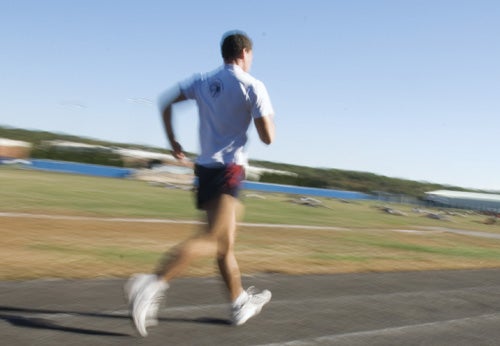Kinesiology

Every day, Chris Raymond ’10 walks into work at Raytheon in Portsmouth, R.I. and heads straight into the fitness center. As an exercise specialist with Plus One, a corporate fitness and wellness company, he spends his day running group fitness classes, teaching clients safe and effective exercise programs, and promoting wellness for the employees at Raytheon. “I’m doing what I always wanted to do,” he says. “I love getting to be in the fitness world every day.” His position allows him to share his passion for exercise and to provide tips to his clients to assist them in making better health choices. Another perk: “I get to work out at work!”
Kinesiology is a broad field encompassing all facets of human movement. “Our students can go anywhere from working with a cardiac patient to training a highly conditioned athlete.
Deborah Riebe, chair of the Kinesiology Department
Raymond landed his job after completing the Kinesiology Program at URI. When he entered the program as a transfer from CCRI, Raymond thought he’d be headed into the physical therapy field. But he, like many others in his department, soon found that physical therapy is just one of many career opportunities available to kinesiology graduates.
“The majority of our students come into our program with the goal of becoming physical therapists,” says Professor Deborah Riebe, chair of the Kinesiology Department. “They learn that physical therapy is a great field, but there are other options.”
Riebe explains that kinesiology is a broad field encompassing all facets of human movement and a wide variety of professions: “Our students can go anywhere from working with a cardiac patient to training a highly conditioned athlete.” Graduates could work in a clinical environment creating exercise prescriptions for people with such health issues as heart disease, obesity, diabetes, or cancer. They could work in a research setting studying the effects of resistance training on strength and balance in older adults. They could design training programs for professional athletes. Or they could be certified to teach physical education and health in elementary and secondary schools. “There are a lot of opportunities!” says Riebe.
About 85 percent of the Kinesiology Department’s 600 undergraduates focus on exercise science or health fitness, with the remainder entering the physical and health teacher education program. With 75 students currently on the program’s waiting list, kinesiology is increasingly becoming a popular major.
Chris Raymond credits his professors with his success both in the program and after graduation: “The professors really know their stuff, they have lots of experience, and they really care about their students.” It was a tip from Riebe that led Raymond to his current position with Plus One. He now works with another URI grad, Andrew DeMacedo ’07, who manages the facility at Raytheon.
Current student Jessica Russo also speaks highly of the individual attention the kinesiology professors give their students. When she visited URI as a high school student, it was a professor’s willingness to give her a personal tour of the facilities that helped set URI apart. Now she is a senior planning to head into a doctoral physical therapy program after graduating in May: “The professors genuinely care about the success of their students and try to give us as many opportunities as possible,” says Russo, who was also attracted to the structure of the program and the preparation it gave her for graduate school. “It was a relief that the program was set up in a way that had me go above and beyond the basic requirements of graduate schools,” she says. “I was never scrambling to fulfill prerequisites because those classes had already been part of my major.” Russo is currently completing her semester-long internship at a private physical therapy clinic in Narragansett.
Internships are a prominent component of the Kinesiology Program. “Every single student in our department does one,” explains Riebe. “We have an internship director who works with the students to find a suitable environment for them.” Usually, internships are in physical therapy clinics, hospitals, cardiac rehab centers, and health and wellness companies. “We’ve even had students go to the Olympic Training Center!” says Riebe. The internships provide work-related experience but also provide students with opportunities to explore other career paths. During the internship seminar, the department brings in speakers from a variety of professions within the kinesiology field to expose students to different career possibilities.
Ronald Scott ’10 was initially thinking of going into physical therapy but had a change of heart when he discovered an unexpected interest in the human heart. At a professor’s recommendation, he began volunteering at the Center for Cardiac Fitness at the Miriam Hospital in Providence. He went on to do his internship at Miriam and was offered a position there after he graduated. He now works at Miriam as an exercise physiologist, creating exercise prescriptions for cardiac patients. He loves seeing the results of his work: “Our patients start off on the first day and sometimes can barely walk five minutes on the treadmill.” But after completing the Center’s 12-week program that includes exercise, nutrition information, stress management tips, and behavioral or dietary modifications, the patients’ stamina and wellness increase dramatically. Scott hopes eventually to become a physician’s assistant. “That internship was a big help,” he remembers. “Not just for me, but for a lot of my classmates. The internship really helps you decide what you want to do for your career.”
Wherever the program leads its graduates, they are able to incorporate a love of physical activity into their careers. “You get intrigued by how the human body works, by how it responds to exercise,” says Riebe. Pursuing a passion for the body and exercise and then being able to share the results with others—from students to the broader community—makes for an ideal work day, every day. “It’s like working your hobby!” says Riebe.
By Bethany Vaccaro ’06
 Home
Home Browse
Browse Close
Close Events
Events Maps
Maps Email
Email Brightspace
Brightspace eCampus
eCampus


